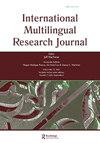Plugging in translanguaging: thinking across theory for methodological innovation in English learner and multilingual education
IF 2.1
1区 文学
Q2 EDUCATION & EDUCATIONAL RESEARCH
引用次数: 0
Abstract
ABSTRACT A translanguaging lens in educational research focuses on social, cultural, and power dynamics of language and multilingualism in practice. It also represents a potentially transformative pedagogical practice that centers the languaging practice, power, and agency of multilingual learners to transgress classroom language borders. However, translanguaging research that focuses on only the social aspects of classroom languaging can be subject to critique for failing to disrupt material inequities related to language and power in the classroom. This conceptual paper explores how thinking across multiple frameworks can generate innovative methodological approaches to knowledge production for translanguaging inquiry in the context of EL and multilingual education. Exploring how translanguaging can be plugged into Blumer’s Symbolic Interactionism, Foucault’s Discourse, and Barad’s Agential Realism, this paper thinks within and against these frameworks to highlight important analytic provocations for now only how translanguaging relations emerge, but also what methodological territory is claimed in the process. A central concern of this paper is the methodological implications of posthumanist theories to develop material-discursive translanguaging inquiry.堵塞跨语言交际:跨理论思考英语学习者与多语言教育的方法创新
教育研究中的跨语言视角聚焦于语言的社会、文化和权力动态以及实践中的多语性。它还代表了一种潜在的变革性教学实践,以多语言学习者的语言实践、权力和代理为中心,跨越课堂语言边界。然而,只关注课堂语言的社会方面的跨语言研究可能会因为未能打破课堂中与语言和权力有关的物质不平等而受到批评。这篇概念性论文探讨了在EL和多语言教育的背景下,跨多个框架的思考如何为跨语言探究产生创新的知识生产方法。本文探讨了跨语言是如何融入布鲁默的象征互动主义、福柯的话语和巴拉德的代理现实主义的,并在这些框架内和反对这些框架的情况下进行思考,以突出跨语言关系是如何产生的,以及在这一过程中声称的方法论领域。本文的一个核心关注点是后人文主义理论对发展材料话语跨语言探究的方法论意义。
本文章由计算机程序翻译,如有差异,请以英文原文为准。
求助全文
约1分钟内获得全文
求助全文
来源期刊
CiteScore
4.10
自引率
4.80%
发文量
19
期刊介绍:
The International Multilingual Research Journal (IMRJ) invites scholarly contributions with strong interdisciplinary perspectives to understand and promote bi/multilingualism, bi/multi-literacy, and linguistic democracy. The journal’s focus is on these topics as related to languages other than English as well as dialectal variations of English. It has three thematic emphases: the intersection of language and culture, the dialectics of the local and global, and comparative models within and across contexts. IMRJ is committed to promoting equity, access, and social justice in education, and to offering accessible research and policy analyses to better inform scholars, educators, students, and policy makers. IMRJ is particularly interested in scholarship grounded in interdisciplinary frameworks that offer insights from linguistics, applied linguistics, education, globalization and immigration studies, cultural psychology, linguistic and psychological anthropology, sociolinguistics, literacy studies, post-colonial studies, critical race theory, and critical theory and pedagogy. It seeks theoretical and empirical scholarship with implications for research, policy, and practice. Submissions of research articles based on quantitative, qualitative, and mixed methods are encouraged. The journal includes book reviews and two occasional sections: Perspectives and Research Notes. Perspectives allows for informed debate and exchanges on current issues and hot topics related to bi/multilingualism, bi/multi-literacy, and linguistic democracy from research, practice, and policy perspectives. Research Notes are shorter submissions that provide updates on major research projects and trends in the field.

 求助内容:
求助内容: 应助结果提醒方式:
应助结果提醒方式:


